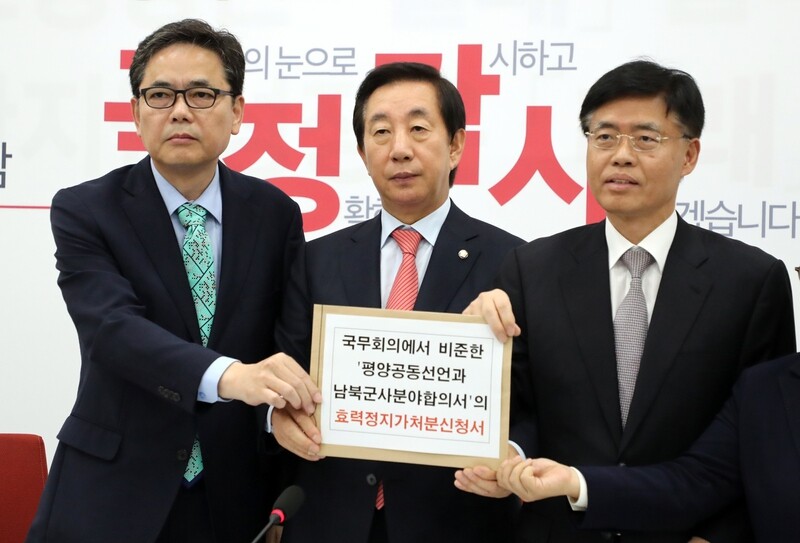hankyoreh
Links to other country sites 다른 나라 사이트 링크
National Assembly in dispute over constitutionality of Moon’s ratification of Pyongyang Declaration

After South Korean President Moon Jae-in ratified the Pyongyang Joint Declaration and the Agreement on the Implementation of the Historic Panmunjom Declaration in the Military Domain (also called the Comprehensive Military Agreement, or CMA) during a Blue House cabinet meeting on Oct. 23, a dispute has erupted over the constitutionality of this action.
The Liberty Korea Party claimed that it was unconstitutional to ratify those agreements without the consent of the National Assembly and promised to take legal action, including asking the Constitutional Court to adjudicate authority on the matter and requesting an injunction suspending the ratification’s legal force. The Blue House fired back that the very act of calling this unconstitutional is unconstitutional.
Article 60, Clause 1, of the South Korean Constitution states that “The National Assembly shall have the right to consent to the conclusion and ratification of treaties pertaining to mutual assistance or mutual security; [. . .] treaties which will burden the State or people with an important financial obligation; or treaties related to legislative matters.”
The Liberty Korea Party, the main conservative opposition, contends that the CMA, which would establish a maritime buffer zone and suspend air reconnaissance activity, counts as a “treaty pertaining to [. . .] security” and that therefore it requires the consent of the National Assembly.
“The question of whether to consent to the ratification of grave matters related to the state’s foreign policy and security is something that must be judged carefully through debate in the National Assembly,” said Liberty Korea Party Floor Leader Kim Sung-tae during a press conference held at the National Assembly on Oct. 24.
Kim also argued that it “it’s not correct in terms of jurisprudence” to ratify the Pyongyang Declaration and the CMA when the Apr. 27 Panmunjom Declaration, which came first, has yet to be ratified by the National Assembly. “This is tantamount to creating the enforcement decree before the actual law has been framed, or to reporting a birth before the baby has been delivered,” he said.
The logical contradiction of acknowledging North Korea as a state
The Blue House countered that “under the South Korean legal system, North Korea is not a state, and therefore any agreements made with the North or promises made to it are not treaties. The Constitution is not applicable here.”
“The treaties mentioned in Article 60 of the Constitution refer to documentary agreements between different states,” Blue House Spokesperson Kim Eui-kyum said during a meeting with reporters on Wednesday, explaining that the inter-Korean agreements do not fall under the scope of the “treaties” that must receive the approval of the National Assembly. In the Development of Inter-Korean Relations Act, inter-Korean relations are defined not as a relationship between states but as a special relationship tentatively formed during the process of moving toward unification.
“Considering that South Korea’s Constitutional Court and Supreme Court have stated categorically that previously concluded inter-Korean agreements are not subject to the Constitution, the assertion that the ratification of the Comprehensive Military Agreement is unconstitutional is a clear violation of the Constitutional Court’s decision and Supreme Court precedent,” Kim said.
“On a more fundamental level, calling this unconstitutional constitutes an undeniable acknowledgment of North Korea as a state. That contradicts Article 3 of the Constitution, which states that ‘The territory of the Republic of Korea shall consist of the Korean peninsula and its adjacent islands.’ The very argument that this is unconstitutional is in fact unconstitutional.”
By Lee Jeong-hun and Seong Yeon-cheol, staff reporters
Please direct comments or questions to [english@hani.co.kr]

Editorial・opinion
![[Column] Has Korea, too, crossed the Rubicon on China? [Column] Has Korea, too, crossed the Rubicon on China?](https://flexible.img.hani.co.kr/flexible/normal/500/300/imgdb/original/2024/0419/9317135153409185.jpg) [Column] Has Korea, too, crossed the Rubicon on China?
[Column] Has Korea, too, crossed the Rubicon on China?![[Correspondent’s column] In Japan’s alliance with US, echoes of its past alliances with UK [Correspondent’s column] In Japan’s alliance with US, echoes of its past alliances with UK](https://flexible.img.hani.co.kr/flexible/normal/500/300/imgdb/original/2024/0419/2317135166563519.jpg) [Correspondent’s column] In Japan’s alliance with US, echoes of its past alliances with UK
[Correspondent’s column] In Japan’s alliance with US, echoes of its past alliances with UK- [Editorial] Does Yoon think the Korean public is wrong?
- [Editorial] As it bolsters its alliance with US, Japan must be accountable for past
- [Guest essay] Amending the Constitution is Yoon’s key to leaving office in public’s good graces
- [Editorial] 10 years on, lessons of Sewol tragedy must never be forgotten
- [Column] A death blow to Korea’s prosecutor politics
- [Correspondent’s column] The US and the end of Japanese pacifism
- [Guest essay] How Korea turned its trainee doctors into monsters
- [Guest essay] As someone who helped forge Seoul-Moscow ties, their status today troubles me
Most viewed articles
- 1[Column] The clock is ticking for Korea’s first lady
- 2Hong Se-hwa, voice for tolerance whose memoir of exile touched a chord, dies at 76
- 3After 2 months of delayed, denied medical care, Koreans worry worst may be yet to come
- 4[Column] Has Korea, too, crossed the Rubicon on China?
- 5[Correspondent’s column] In Japan’s alliance with US, echoes of its past alliances with UK
- 6US overtakes China as Korea’s top export market, prompting trade sanction jitters
- 7Samsung barricades office as unionized workers strike for better conditions
- 8All eyes on Xiaomi after it pulls off EV that Apple couldn’t
- 9More South Koreans, particularly the young, are leaving their religions
- 10John Linton, descendant of US missionaries and naturalized Korean citizen, to lead PPP’s reform effo